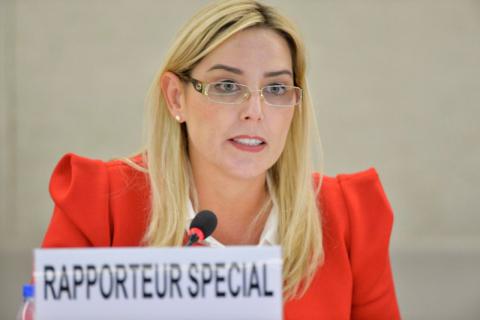
On 18 June 2015, during the Human Rights Council (HRC)'s 29th session, the Special Rapporteur on the Independence of Judges and Lawyers (SR IJL), Gabriela Knaul, presented the report on her visit to the United Arab Emirates (UAE) from 27 January to 5 February 2014 to assess the independence of the judiciary. Although Mrs Knaul welcomed the country's recent progress, such as the accession to various human rights treaties including the Convention against Torture (UNCAT) in July 2012, she expressed deep concerns over the human rights situation in the country, in particular with regards to the lack of independence of judges and lawyers, and the grave violations that persist, including secret and incommunicado detention and torture.
During her visit, the Special Rapporteur met with a number of government officials of the Ministries of Justice, Interior and Foreign Affairs, the Abu Dhabi Judicial Department, as well as the Chief Justice of the Federal Supreme Court, federal and local judges, the Attorney General, and members of the federal and local public prosecution offices.
She also met with lawyers and members of the civil society, including Osama Al Najjar, an Emirati blogger and activist who was secretly detained and tortured for having expressed criticism against the Emir on Twitter, as well as having met with the UN expert during her visit. Son of Husain Al Najjar – a member of Al-Islah (Call for Reform), a non-violent political group calling for constitutional reform of the Emirates, who was arbitrarily tried in the UAE 94 case – Osama was accused of "belonging to Al-Islah," "offending the State via Twitter," "instigating hatred against the State via Twitter" or "spreading false information according to which his father was tortured in Emirati jails."
Unfair trials and lack of independence of judges and lawyers
While noting that the country's Constitution recognises the independence of judges and guarantees fundamental rights, the UN expert expressed deep concern over the UAE's justice system. In particular, she identified alarming patterns of breaches of rights to a fair trial, due process and the administration of justice, and pointed to serious flaws especially in cases of State security or "terrorism." In fact, the already limited guarantees against arbitrary arrest and detention do not apply to persons arrested under these charges. Even though the Code of Criminal Procedure prescribes the need for an arrest warrant, except for cases of flagrante delicto, many people are arrested without a warrant, particularly when they are suspected of "State security" crimes.
Regarding the work of lawyers, Mrs Knaul explained that an accused person's access to a lawyer is often restricted during the investigative phase, especially for suspects of State security crimes. Meetings with lawyers are kept short, are not private and may even be recorded by the prosecution. The Special Rapporteur also emphasised that lawyers at the State Security Chamber of the Federal Supreme Court are encountering difficulties in accessing their clients' files and that hearings are not always public. Furthermore, some lawyers taking up cases related to State security crimes have been harassed, threatened and pressured, in addition to facing daily difficulties to represent their clients' interests.
Such impediments are all the more concerning that those convicted of committing a State security crime cannot have their case reviewed by a higher tribunal, since although all convicts have the right to have their sentence reviewed by a higher court, crimes against the State security fall under the exclusive jurisdiction of the Federal Supreme Court, the highest tribunal of the UAE.
Secret detention and torture
Mrs Knaul added that "after being arrested by State security agents, most of those individuals were taken to secret detention facilities and kept incommunicado for days, weeks or even months, sometimes in solitary confinement. Such detentions may sometimes amount to enforced disappearances, as the authorities refuse to acknowledge that they have detained the person and/or refuse to confirm their fate and whereabouts." In such places of secret detention, individuals have no access to a lawyer and many are tortured, including with the aim to extract confessions which will be used as evidence in the course of the proceedings.
In this regard, the Special Rapporteur pointed out that any evidence obtained through unlawful techniques, especially through torture, must not be used in court. She highlighted that more than 200 complaints of torture were presented before judges and prosecutors over the past years, but that no independent investigation was opened into the allegations, creating a climate of impunity and violating the country's obligations under the CAT.
During the presentation of the report before the UN Human Rights Council, the UAE state representative commented on the report without addressing most of the issues raised by the Special Rapporteur. Instead, the delegate only emphasised the positive aspects of the report and affirmed that it was containing "erroneous claims," as the Special Rapporteur had "jumped into conclusions without specifying the criteria used in assessing the sources and information," rendering the report "unreliable." The UAE also regretted that Mrs Knaul did not provide names of persons concerned or dates and details of specific cases, making it impossible for the government to investigate such incidents.
For more information or an interview, please contact the media team at media@alkarama.org (Dir: +41 22 734 1008)
